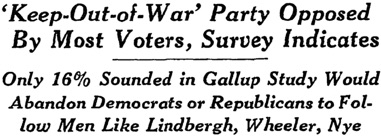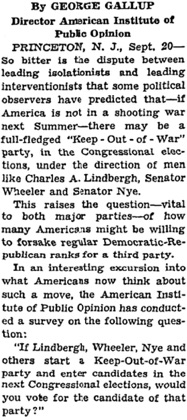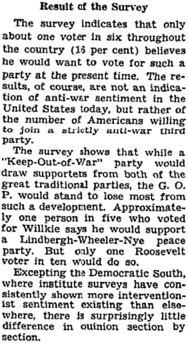The Great Dictator 1939 1940 next previous
The Great Dictator Clippings 328/369
UP, Los Angeles Times, Los Angeles, Calif., Sept. 17, 1941.
„Keep.Out-of-War“ Party Opposed
By Most Voters, Survey Indicates
Only 16% Sounded in Gallup Study Would Abandon
Democrats or Republicans to Follow Men Like Lindbergh,
Wheeler, Nye
By GEORGE GALLUP
Director American Institute of Public Opinion
PRINCETON, N. J., Sept. 20 – So bitter is the dispute
between leading isolationist and leading interventionists
that some political observers have predicted that – if America
is not in a shooting war next Summer – there may be
a full-fledged „Keep-Out-of-War“ party, in the Congressional
elections, under the direction of men like Charles A.
Lindbergh, Senator Wheeler and Senator Nye.
This raises the question – vital to both major parties –
of how many Americans might be willing to forsake
regular Democratic-Republican ranks for a third party.
In an interesting excursion into what Americans
now think about such a move, the American Institute of Public
Opinion has conducted a survey on the following
question:
„If Lindbergh, Wheeler, Nye and others start
a Keep-Out-of-War party and enter candidates in the next
Congressional elections, would you vote for the
candidate of that party?“
Result of the Survey
The survey indicates that only about one voter in six
throughout the country (16 per cent) believes
he would want to vote for such a party at the present time.
The results, of course, are not an indication of
anti-war sentiment in the United States today, but rather
of the number of Americans willing to join a strictly
anti-war third party.
The survey shows that while a „Keep-Out-of-War“ party
would draw supporters from both of the great
traditional parties, the G. O. P. would stand to lose most
from such a development. Approximately one
person in five would support a Lindbergh-Wheeler-Nye
peace party. But only one Roosevelt voter in ten
would do so.
Excepting the Democratic South, where institute surveys
have consistently shown more interventionist sentiment
existing than elsewhere, there is surprisingly little difference
in opinion section by section.
(...) New York Times, Sept. 21, 1941
„That fake story about Samaritan dangerous“
Editorial content. „President Hits
Film Inquiry
Roosevelt Denies Pressure Used
to Get Propaganda Pictures
WASHINGTON, Sept. 16. (U.P.) – President Roosevelt
today said that neither he nor, to his knowledge, any
of his subordinates in the government, has brought pressure
on the motion-picture industry for production
of propaganda films.
He made clear to his press conference that he has little
sympathy with the current investigation by a Senate
Interstate Commerce subcommittee into alleged propaganda
films. The subcommittee yesterday was told that
a Loew‘s, Inc. official claimed Federal officials were exceedingly desirous that the film The Land of Liberty be shown.
CARTOON ON CHAPLIN
Mr. Roosevelt recommended to the reporters a cartoon
published in the Washington Star today. It depicted
Charlie Chaplin – who is to testify later – with a Senate
committee subpoena in his hand and commenting:
,Now what could I possibly tell those past masters
about comedy?‘
Chaplin‘s comedy, The Dictator, has been criticized before
the committee as a propaganda picture.
TELEGRAM READ
The President then read this telegram, which he said was
sent to an unidentified Senator on Sept. 10.
,Have just been reading book called Holy Bible. Has
large circulation in this country. Written entirely by
foreign-born, mostly Jews. First part full of war-mongering
propaganda. Second part condemns isolationism.
That fake story about Samaritan dangerous. Should be added
to your list and suppressed.‘
He implied that the telegram expresses approximately
his attitude toward the subcommittee‘s film inquiry.
The discussion opened when a reporter reminded Mr.
Roosevelt that he was known as a movie fan and
asked whether he had noticed any propaganda in recent
pictures. The President said he had not.
PRESSURE DENIED
Then he was asked about charges that the government
had brought pressure on the film industry for production
of propaganda pictures. The government, he replied, is a broad
word. But he added that the head of the government
certainly has not brought such pressure.“ (...)
UP, United Press.
Redaktioneller Inhalt
The Great Dictator 1939 1940 next previous




